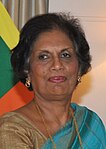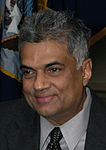
Parliamentary elections were held in Sri Lanka on 2 April 2004. The ruling United National Party of Prime Minister Ranil Wickremesinghe was defeated, winning only eighty two seats in the 225-member Sri Lankan parliament. The opposition United People's Freedom Alliance won 105 seats. While this was eight seats short of an absolute majority, the Alliance was able to form a government.

Parliamentary elections were held in Sri Lanka on 5 December 2001, just a little over a year after the previous elections in October 2000.
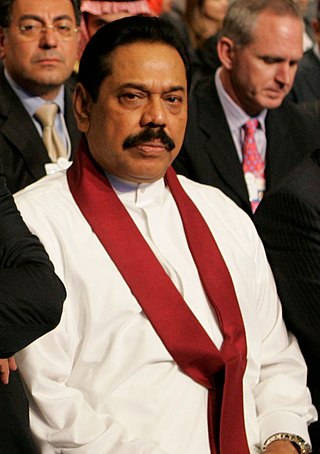
Presidential elections were held in Sri Lanka on 17 November 2005. Nominations were accepted on 7 September 2005 and electoral participation was 73.73%. Prime Minister Mahinda Rajapaksa of the governing United People's Freedom Alliance was elected, receiving 50.3% of all votes cast.

Parliamentary elections were held in Sri Lanka on 16 August 1994. They marked the decisive end of seventeen years of United National Party rule and a revival of Sri Lankan democracy.

Parliamentary elections were held in Sri Lanka on 15 February 1989, the first since 1977. The elections that should normally have been held by 1983 had been cancelled by the 1982 referendum.

Dinesh Chandra Rupasinghe Gunawardena is a Sri Lankan politician serving as the Prime Minister of Sri Lanka since 22 July 2022. He also holds the positions of Minister of Public Administration, Home Affairs, Provincial Councils and Local Government. Gunawardena has been leader of the left-wing Mahajana Eksath Peramuna (MEP) party since 1983, and has taken cabinet positions under several previous governments, including Leader of the House from 2020 until 2022.
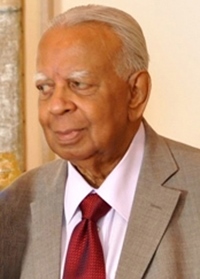
Rajavarothiam Sampanthan is a Sri Lankan Tamil politician and lawyer who has led the Tamil National Alliance since 2001. He has also been a Member of Parliament since 2001, and previously served as a Member of Parliament from 1977 to 1983 and from 1997 to 2000. He was the Leader of the Opposition from September 2015 to December 2018.
Trincomalee Electoral District is one of the 22 multi-member electoral districts of Sri Lanka created by the 1978 Constitution of Sri Lanka. The district is conterminous with the administrative district of Trincomalee in the Eastern province. The district currently elects 4 of the 225 members of the Sri Lankan Parliament and had 246,890 registered electors in 2010.
Ampara (Digamadulla) Electoral District is one of the 22 multi-member electoral districts of Sri Lanka created by the 1978 Constitution of Sri Lanka. The district is conterminous with the administrative district of Ampara in the Eastern province. The district currently elects 7 of the 225 members of the Sri Lankan Parliament and had 436,148 registered electors in 2010.
Kalmunai Electoral District was an electoral district of Sri Lanka between August 1947 and February 1989. The district was named after the town of Kalmunai in Ampara District, Eastern Province. The 1978 Constitution of Sri Lanka introduced the proportional representation electoral system for electing members of Parliament. The existing 160 mainly single-member electoral districts were replaced with 22 multi-member electoral districts. Kalmunai electoral district was replaced by the Ampara (Amparai) multi-member electoral district at the 1989 general elections, the first under the PR system, though Kalmunai continues to be a polling division of the multi-member electoral district.

Abdul Rauff Hibbathul Hakeem is a Sri Lankan politician and current member of parliament, representing the Kandy electorate since 2010. Hakeem is the leader of the Sri Lanka Muslim Congress (SLMC), and a member of the United National Front for Good Governance.
Mohamed Najeeb Abdul Majeed is a Sri Lankan politician, former Member of Parliament and former Chief Minister of Eastern Province.

Parliamentary elections were held in Sri Lanka on 8 and 20 April 2010, to elect 225 members to Sri Lanka's 14th Parliament. 14,088,500 Sri Lankans were eligible to vote in the election at 11,102 polling stations. It was the first general election to be held in Sri Lanka following the conclusion of the civil war which lasted 26 years.
Mohamed Shariff Thowfeek is a Sri Lankan politician, former provincial councillor, former deputy minister and Member of Parliament.
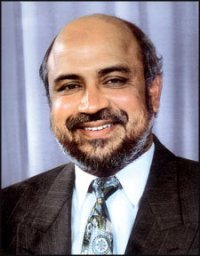
Mohammed Hussain Mohammed Ashraff was a Sri Lankan lawyer, politician, government minister and founder/leader of the Sri Lanka Muslim Congress.
Mahamood Lebbe Alim Mohamed Hizbullah is a Sri Lankan politician and state minister. He was a minor presidential candidate in the 2019 presidential elections.
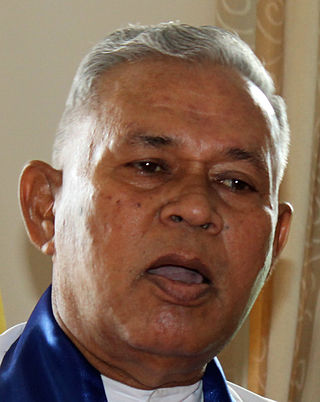
Munasinghe Kariyawasam Appuhamilage Don Somadasa Gunawardana was a Sri Lankan politician and a former member of Parliament and government minister.

Mohamed Ehuttar Hadjiar Maharoof was a Sri Lankan politician and Member of Parliament.

Uduma Lebbe Mohamed Mohideen was a Sri Lankan lawyer, politician, Member of Parliament and deputy minister.
W. D. Weerasingha is a Sri Lankan politician, former provincial councillor and Member of Parliament.

